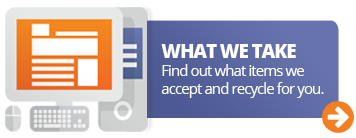
An essential part of running a business is to keep up to date with technology, which requires periodically updating your electronic devices. However, the old devices that have been replaced pose a problem for many small businesses — what do you do with the old tech when you replace it?
While throwing old cables and computers out with your general office waste may seem like the easy answer, the better business decision is to responsibly recycle your old or unused electronics.
Recent research commissioned by TechCollect revealed that 83% of Australians weren’t sure where they could recycle e-waste. And 58% said they didn’t want to pay to have devices properly recycled. You’re not alone when it comes to the issue of e-waste in your office; many businesses just aren’t aware of the real benefits of recycling e-waste, or how to start. It’s much easier than you think — here’s what you need to know:
1. Make a positive difference to the environment
The most obvious, yet greatest benefit of recycling e-waste is the positive impact it has on our environment. Many electronic devices contain heavy metals like lead and mercury, which can be extremely harmful to both land and water. Recycling these devices ensures materials don’t end up in landfill, and are instead correctly and safely recovered and recycled.
Electronic devices also contain non-renewable resources, which, if recycled correctly, can be recovered and re-used in the manufacturing of new products. Keeping resources in use is the best outcome and leads to a circular economy.
Recycling is often viewed as a civic duty; however, it is just as important for businesses to consider their environmental impact as part of their daily practice. This is not only beneficial to the environment, but is often expected by consumers, clients and employees.
2. Happy employees
Did you know more than three-quarters of Australian employees want business owners to take more action when it comes to recycling workplace technology?1
With environmental concerns increasing among Australians, employees are beginning to expect recycling e-waste to be common practice in the workplace. In fact, an increasing number of prospective employees are looking to work for businesses that operate under ethical policies and actively make business decisions in which positive environmental outcomes are a priority.
Beyond recruitment, sustainable workplace policies help retain current employees — keeping them happier, productive and more engaged.
3. Improve your brand reputation
Showing your commitment to the environment can strengthen your reputation with current and prospective customers. Recent research shows businesses and brands with a demonstrated commitment to sustainability outperform those who don’t2.
It’s becoming increasingly common to select your business partners based on their ethical standing as organisations. Businesses which actively strive to have a positive impact on the environment make more desirable business partners and a compelling choice for customers. Implementing e-waste recycling is a simple way to enhance your business’s green credentials.
4. Declutter the office
Old and unused electronic devices are often sitting at the back of cupboards gathering dust, or you may even have shelves or the corner of an office dedicated to old technology storage. Not only will recycling your old e-waste benefit the environment — by reducing landfill and the need to mine new resources — but you’ll also have a clean, decluttered office, which ultimately improves efficiency and harmony in the office!
5. Lower business costs
Recycling also has a significant and tangible impact on your bottom line. Did you know that recycling is less expensive than waste removal fees, which are measured by weight?
It is important to choose both a cost-effective and reputable recycling program for your business. Some organisations, including TechCollect, which is dedicated to setting the highest standard of Australian recycling, will collect and recycle your business’s e-waste for free.
What about your data?
Our recent research revealed 52% of Australians are not recycling their IT e-waste due to concerns about security of data.
In fact, personal data was highlighted as a key concern twice, with 64% of respondents also stating they don’t recycle their e-waste because they worry their data will get into the wrong hands. This number has increased by 25% in just two years.
In this technological age, it’s understandable to be concerned about data security and privacy. However, it is relatively simple to permanently remove your data from your company’s electronic devices before they are safely recycled. All you need to do is search online for data wiping services or software, or check with the product manufacturer on how to delete your data. There are also secure commercial services that specialise in data deletion. Be proactive in your data management and don’t let it be a barrier to doing the right thing by the environment!
How do I start?
Below is a simple, step-by-step process to recycle IT e-waste in your office:
- Get the whole team involved.
- Gather all your unwanted and unused IT e-waste from around the workplace.
- Remove your data: search online for data deletion services or software or check with the manufacturer of your product to discover how to delete your data.
- If you have a significant amount of e-waste, call TechCollect on 1300 229 837 to see if your small business qualifies for a free pick-up. TechCollect will take IT and TVs; check out https://techcollect.dycomweb.com/what-we-take.
- Or, find your nearest free drop-off point at https://techcollect.dycomweb.com/our-locations/. If you can’t find a TechCollect service near you, check out http://recyclingnearyou.com.au.
- Drop off your e-waste, and enjoy your new decluttered office and shining business reputation!
References
1Planet Ark, 2016. National Recycling Week. So You Think You Can Recycle Report, http://recyclingweek.planetark.org/documents/doc-1451-nrw-2016-report-so-you-think-you-can-recycle.pdf
2http://businessrecycling.com.au/research/business-case-competetive-edge.cfm
By Warren Overton, CEO, Australia and New Zealand Recycling Platform
Originally published on Tuesday, 27 February, 2018 by Sustainability Matters










